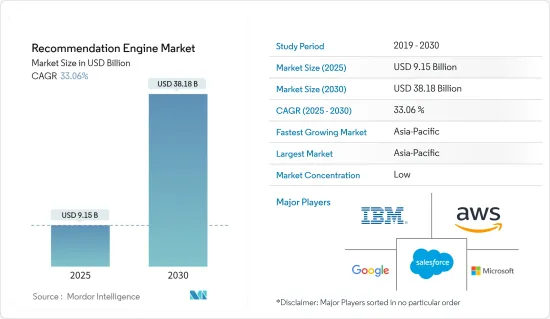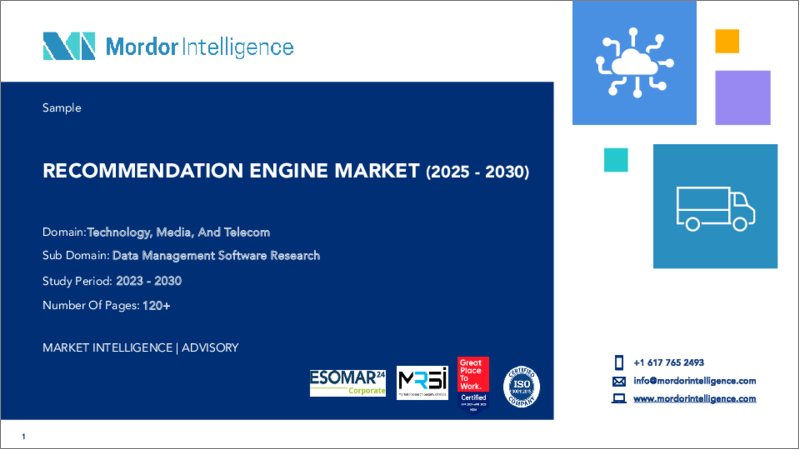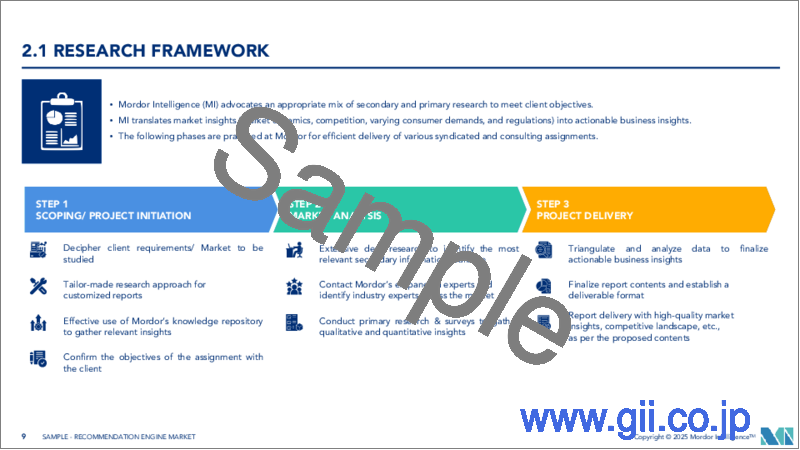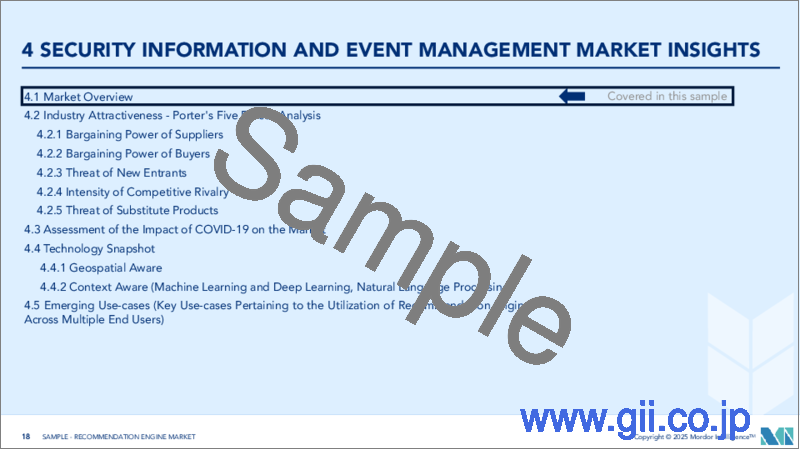|
|
市場調査レポート
商品コード
1689697
レコメンデーションエンジン:市場シェア分析、産業動向・統計、成長予測(2025年~2030年)Recommendation Engine - Market Share Analysis, Industry Trends & Statistics, Growth Forecasts (2025 - 2030) |
||||||
カスタマイズ可能
適宜更新あり
|
|||||||
| レコメンデーションエンジン:市場シェア分析、産業動向・統計、成長予測(2025年~2030年) |
|
出版日: 2025年03月18日
発行: Mordor Intelligence
ページ情報: 英文 168 Pages
納期: 2~3営業日
|
全表示
- 概要
- 目次
レコメンデーションエンジン市場規模は、2025年に91億5,000万米ドルと推定され、予測期間(2025~2030年)のCAGRは33.06%で、2030年には381億8,000万米ドルに達すると予測されます。

企業数の増加と企業間競争の激化に伴い、多くの企業が人工知能(AI)などの技術を自社のアプリケーション、ビジネス、アナリティクス、サービスに統合しようとしています。世界のほとんどの組織は、顧客と従業員のエクスペリエンス向上に焦点を当てたデジタルトランスフォーメーションを追求しており、これは自動化ソリューションによって活用されています。
主要ハイライト
- 新興国におけるデジタル化の進展とeコマース市場の成長が、レコメンデーションエンジンの需要を押し上げています。AIベースのクラウドプラットフォームに機械学習モデルを統合することで、複数のエンドユーザー産業で自動化が推進されています。
- 消費者は従来、店頭で購入の意思決定を行うため、実店舗型の小売業者は消費者の行動や嗜好を知り、それに影響を与える高い能力を有していました。しかし、インターネットの普及が進み、eコマースやモバイルショッピング、スマート技術による新たな流通チャネルが出現したことで、小売産業は新たな先端技術に適応しつつあります。スマートPOSソリューションやセルフチェックアウトキオスクなどのこれらの技術は、従来の実店舗をオムニチャネル店舗へと変貌させています。ZDNetによると、70%の企業がデジタルトランスフォーメーション戦略を策定しているか、策定中であるといいます。
- デジタルトランスフォーメーションは、小売企業にとって、新規顧客の獲得、既存顧客とのエンゲージメントの向上、運営コストの削減、従業員のモチベーション向上などの機会を記載しています。これらのメリットは、りわけ収益と利益率にプラスの影響を与えます。この好影響は、予測期間中にレコメンデーションエンジン採用の大きな機会を生み出すと考えられます。
- レコメンデーションエンジン市場にとって、ユーザーの嗜好の変化による誤ったラベリングという課題は継続的な懸念事項です。しかし、開発者はレコメンデーションの精度と関連性の向上に継続的に取り組んでいます。技術の進歩に伴い、将来的にはこの課題に対するより効果的なソリューションが登場することが期待されます。
- シスコの一部であるAppDynamicsが最近発表した「Agents of Transformation Report」によると、COVID-19の大流行中に95%の組織で技術の優先順位が変化し、88%がデジタル顧客体験が組織の優先事項であると報告しました。顧客は、チャット、メッセージング、会話ボットなどのセルフサービスツールに目を向けた。その結果、企業はこれらのツールで優れたカスタマーエクスペリエンスを提供できるようになり、同時に、ソーシャルディスタンス(社会的距離)の時代には実現不可能だった、実店舗やライブイベントへの従来の依存を減らすことができました。この結果、レコメンデーションエンジンによって達成される利益は、これらの企業における技術導入の増加により、さらに増加すると予想されました。
レコメンデーションエンジンの市場動向
モバイルとウェブを横断したデジタルコマース体験のカスタマイズに対する需要の高まりが市場の成長を牽引
- 企業は、高度にパーソナライズされた顧客体験を提供することで、競合他社が真似しにくい優位性を活用する方法や技術を模索しています。このようなエクスペリエンスでは、独自のデータを使用して、何百万人もの個々の顧客により良いエクスペリエンスを記載しています。その成果は実行にかかっています。パーソナライズされた顧客体験がうまく実行されれば、企業は差別化を図り、顧客ロイヤルティとサステイナブル競合優位性を獲得することができます。
- 顧客の意思決定は、もはや実店舗で行われるのではなく、ウェブブラウザや携帯電話を使って、デジタル棚の前でオンラインで行われるようになっています。小売業を営む企業にとって、商品の価格、場所、プロモーションは、もはや近隣の棚の商品と比較されるだけでなく、世界中のウェブサイトを持つ小売業者の代替商品と比較されるようになっています。この点で、AIやMLを利用したレコメンデーションエンジンなどの技術は、顧客の要求を確実に満たし、顧客のニーズと提供する商品が同じレベルにあることを保証し、競合他社より一歩先を行くのに十分です。
- ここ数年、組織全体の多くのマーケティング担当者は、顧客の要求の高まりから、カスタマーエクスペリエンスの強化に重点を置くようになっています。例えば、Adobeによると、最も強固なオムニチャネル顧客エンゲージメント戦略を持つ企業は、前年比10%の成長、平均注文金額の10%の増加、成約率の25%の増加を確認することができます。また、強固なオムニチャネル顧客エンゲージメント戦略と消費者サービス向上プログラムを採用したブランドは、平均89%の顧客を維持しているのに対し、オムニチャネル顧客エンゲージメント戦略が弱いブランドは33%でした。
- チャネルの数が増えるにつれ、技術は、ブランドがすべてのチャネルで一貫したメッセージを提供できるようにします。より良い顧客サービスに対する需要の高まりは、需要を促進し、予測期間中の市場にプラスの影響を与えると予想されます。
- 全体として、パーソナライズされたデジタル商取引体験に対する需要の高まりが、レコメンデーションエンジン市場を牽引しています。Thales Groupによると、銀行・金融セクタは消費者情報のセキュリティにおいて信頼できると考えられています。世界の消費者の40%以上が、デジタルバンキングと金融サービス部門にデータを託すと回答しています。医療プロバイダは、デジタルサービス部門で2番目に信頼できる産業であり、回答者の37%がこの部門を最も安全な産業の1つであると回答しました。企業はAI技術を活用し、対象を絞った顧客推奨を提供し、売上を促進し、顧客満足度を向上させようとしています。
アジア太平洋が急成長
- オーストラリア、インド、中国、韓国といった国々に牽引され、アジア太平洋がレコメンデーションエンジン市場で最も速い成長を遂げると予想されています。
- 中国は、アジア太平洋で技術導入が進んでいる主要国のひとつです。この国には、最速のインターネットバンドがあり、Alibabaのような強力なeコマース・参入企業がいます。
- さらに、中国は米国に次いで世界第2位のOTT市場です。メキシコ連邦通信ラボ(Instituto Federal de Telecommunications)によると、中国では100世帯あたり68件の加入があり、オンラインビデオユーザーの割合は効果的に増加しています。しかし、産業を取り巻く規制や使用されるデータ、国内で流通が許可されるコンテンツに関しては非常に厳しいです。
- FAANG(Facebook、Amazon、Apple、Netflix、Google)のような国際的な参入企業が国内で事業を展開することを妨げている中国の厳しい規制環境によって、三者(iQiyi、Tencent、Youku)の支配はさらに確実なものとなっています。これらの国際的参入企業は、レコメンデーションエンジンを大規模に使用し、広告を通じて他のビジネスを推進しています。このため、この地域には国内参入企業に十分な機会が残されており、米国に比べると緩やかな成長にとどまっています。
- さらに、eコマース大手のAlibabaは、AIと機械学習を使ってレコメンデーションを推進しています。例えば、AI OSはAlibabaの検索エンジニアリングチームが開発したオンラインプラットフォームで、パーソナライズされた検索、レコメンデーション、広告を統合しています。AI OSエンジンシステムは、Taobao Mobileの全検索ページ、主要なプロモーション活動のためのTaobao Mobile情報フロー会場、Taobaoホームページの商品レコメンデーション、パーソナライズされたレコメンデーション、カテゴリーや業種による商品選択など、さまざまなビジネスシナリオをサポートしています。
レコメンデーションエンジン産業概要
レコメンデーションエンジン市場は、IBM Corporation、Google LLC(Alphabet Inc.)、Amazon Web Services Inc(Amazon.com Inc.)、Microsoft Corporation、Salesforce Inc.などの主要企業が存在し、細分化されています。同市場の参入企業は、製品提供を強化し、サステイナブル競争優位性を獲得するために、提携、合併、買収などの戦略を採用しています。
- 2023年1月-Coveoから新しいCoveo Merchandising Hubのデビューが発表されます。このハブは、関連性の高いショッピングジャーニーを提供し、ロイヤルティの醸成と収益性の向上を支援する豊富な機能セットを記載しています。このハブは、マーチャンダイザーが、コンバージョンにつながるテーラーメイドの体験を創造できるように設計されています。ロンドンを拠点とし、ファッション企業や小売業者向けにAIを活用したカスタマイズ技術を提供する新興企業Qubitは、2021年10月にCoveoに買収されました。
- 2022年10月-Algonomyは、ShopifyとCommerceetools向けの2つの重要なコネクタの提供を発表しました。Algonomy Connectorsは、オンラインショップとShopifyまたはCommercecetoolsを統合するためのシンプルな方法を提供し、リアルタイムの製品データ収集を可能にします。Connectorsは、カタログ統合プロセスのコントロールと洞察を改善し、カタログデータを定期的に更新するために外部の組織やリソースに依存する必要性を取り除きます。
その他の特典
- エクセル形式の市場予測(ME)シート
- 3ヶ月間のアナリストサポート
目次
第1章 イントロダクション
- 調査の前提条件と市場定義
- 調査範囲
第2章 調査手法
第3章 エグゼクティブサマリー
第4章 市場洞察
- 市場概要
- 産業の魅力-ポーターのファイブフォース分析
- 供給企業の交渉力
- 買い手/消費者の交渉力
- 新規参入業者の脅威
- 競争企業間の敵対関係
- 代替品の脅威
- COVID-19の市場への影響評価
- 技術スナップショット
- 空間認識
- コンテキスト・アウェア(機械学習と深層学習、自然言語処理)
- 新たな使用事例(複数のエンドユーザーにわたるレコメンデーションエンジンの活用に関する主要使用事例)
第5章 市場力学
- 市場促進要因
- モバイルとウェブにおけるデジタルコマース体験のカスタマイズに対する需要の高まり
- マーチャンダイジングと在庫ルールを管理するための小売業者による採用の増加
- 市場抑制要因
- ユーザー嗜好の変化による誤ったラベリングに関する複雑さ
第6章 市場セグメンテーション
- 導入形態別
- オンプレミス
- クラウド
- タイプ別
- 協調フィルタリング
- コンテンツベースフィルタリング
- ハイブリッド推薦システム
- その他
- エンドユーザー産業別
- IT・通信
- BFSI
- 小売
- メディアエンターテイメント
- 医療
- その他
- 地域別
- 北米
- 欧州
- アジア太平洋
- ラテンアメリカ
- 中東・アフリカ
第7章 競合情勢
- 企業プロファイル
- IBM Corporation
- Google LLC(Alphabet Inc.)
- Amazon Web Services Inc.(Amazon.com, Inc.)
- Microsoft Corporation
- Salesforce Inc.
- Unbxd Inc.
- Oracle Corporation
- Intel Corporation
- SAP SE
- Hewlett Packard Enterprise Development LP
- Qubit Digital Ltd(COVEO)
- Algonomy Software Pvt. Ltd
- Recolize GmbH
- Adobe Inc.
- Dynamic Yield Inc.
- Kibo Commerce
- Netflix Inc.
第8章 投資分析
第9章 市場の将来
The Recommendation Engine Market size is estimated at USD 9.15 billion in 2025, and is expected to reach USD 38.18 billion by 2030, at a CAGR of 33.06% during the forecast period (2025-2030).

With the growing number of enterprises and the rising competition among them, many companies are trying to integrate technologies, like artificial intelligence (AI), with their applications, businesses, analytics, and services. Most organizations globally are pursuing digital transformation, focusing on improving the experience of customers and employees, which is being leveraged by automation solutions.
Key Highlights
- The advancement of digitalization across emerging economies, coupled with the growth of the e-commerce market, has driven the demand for recommendation engines. Integrating the machine learning model across AI-based cloud platforms drives automation across multiple end-user industries.
- Consumers traditionally make purchase decisions at the store shelf, providing institutional brick-and-mortar retailers a high-power level to learn about and influence consumers' behavior and preferences. However, with the rise of internet penetration and the emergence of new sales channels through e-commerce, mobile shopping, and smart technologies, the retail industry is adapting to new and advanced technologies. These technologies, such as smart point-of-sale solutions and self-checkout kiosks, transform traditional brick-and-mortar stores into omnichannel ones. According to ZDNet, 70% of the companies either have a digital transformation strategy or are working with one.
- Digital transformation provides opportunities for retailers to acquire new customers, engage with existing customers better, reduce the cost of operations, and improve employee motivation. These benefits, among others, positively impact the revenue and margins. This positive impact will create significant opportunities for adopting recommendation engines over the forecast period.
- The challenge of incorrect labeling due to changing user preferences is an ongoing concern for the recommendation engine market. However, developers are continually working to improve the accuracy and relevance of recommendations. As technology advances, we can expect to see more effective solutions to this challenge in the future.
- According to the recent "Agents of Transformation Report" from AppDynamics, part of Cisco, technology priorities during the COVID-19 pandemic changed within 95% of organizations, and 88% reported that digital customer experience was the priority for their organization. Customers turned to self-service tools in the form of chats, messaging, and conversational bots. As a result, companies enabled these tools to deliver a great customer experience while reducing traditional dependencies on brick-and-mortar and live events, which were not feasible in a time of social distancing. This was further expected to increase the benefits achieved by recommendation engines due to the increased adoption of technologies in these companies.
Recommendation Engine Market Trends
Increasing Demand for Customization of Digital Commerce Experience Across Mobile and Web Drives the Market's Growth
- Enterprises are looking for ways and technologies to leverage the advantage that could be difficult for their competitors to imitate by providing highly personalized customer experiences. Such experiences use proprietary data to offer a better experience to millions of individual customers. The results depend on the execution. When executed well, personalized customer experience can enable businesses to differentiate themselves and gain customer loyalty and sustainable competitive advantage, which is much needed in the present scenario.
- Customers' decisions are no longer being made in a physical store but online on web browsers and mobile phones in front of the digital shelf. For the enterprises operating in the retail space, the price, place, and promotion of their products are no longer just being compared to products on neighboring shelves but to alternative products from retailers with websites worldwide. In this regard, technologies such as recommendation engines, using AI and ML, ensure customers' requirements are met and ensure that customers' needs and offerings are on the same level, enough to be one step ahead of their competitors.
- Over the years, many marketing professionals across organizations have increased their focus on enhancing customer experience due to the customers' growing demand. For instance, according to Adobe, companies with the most robust omnichannel customer engagement strategies could witness a 10% Y-o-Y growth, a 10% increase in average order value, and a 25% increase in close rates. Also, brands that adopted robust omnichannel customer engagement strategies and consumer service enhancement programs retain, on average, 89% of their customers, compared to 33% for brands with weak omnichannel customer engagement strategies.
- With a growing number of channels coming into play, technologies ensure that the brands provide a consistent message about their offerings across all channels. The growing demand for better customer service is expected to drive the demand and positively affect the market during the forecast period.
- Overall, the growing demand for personalized digital commerce experiences drives the recommendation engine market. According to Thales Group, the banking and financial sector was considered trustworthy for the security of consumers' information. Over 40% of consumers globally stated they trusted the digital banking and financial services sector with their data. Healthcare providers were the second-most trusted industry in the digital services sector, with 37% of the respondents indicating this sector as among the most secure. Businesses seek to leverage AI technology to deliver targeted customer recommendations, drive sales, and improve customer satisfaction.
Asia-Pacific to Witness the Fastest Growth
- Led by countries like Australia, India, China, and South Korea, the Asia-Pacific region is expected to witness the fastest growth in the recommendation engine market.
- China is one of the major countries in Asia-Pacific with growing technological adoption. The country is home to one of the fastest internet bands and strong e-commerce players, like Alibaba.
- Moreover, China is the second-largest OTT market in the world after the United States. According to Instituto Federal de Telecommunications (Mexico), there were 68 subscriptions per 100 homes in China, and the rate of online video users is increasing effectively. However, the country is very strict in terms of regulations surrounding the industry and the data used, as well as the content that is allowed to be circulated in the country.
- The tripartite (iQiyi, Tencent, Youku) domination is further secured by the strict regulatory environment in China, which prevents international players, such as the FAANG (Facebook, Amazon, Apple, Netflix, and Google), from operating in the country. These international players use the recommendations engine at a large scale and drive other businesses through advertising. This leaves the region ample opportunities for domestic players, thus leading to moderate growth compared to the United States.
- Furthermore, one e-commerce giant, Alibaba, uses AI and machine learning to drive its recommendations. For instance, AI OS is an online platform developed by the Alibaba search engineering team that integrates personalized search, recommendation, and advertising. The AI OS engine system supports various business scenarios, including all Taobao Mobile search pages, Taobao Mobile information flow venues for major promotion activities, product recommendations on the Taobao homepage, personalized recommendations, and product selection by category and industry.
Recommendation Engine Industry Overview
The recommendation engine market is fragmented with the presence of major players like IBM Corporation, Google LLC (Alphabet Inc.), Amazon Web Services Inc.(Amazon.com Inc.), Microsoft Corporation, and Salesforce Inc. Players in the market are adopting strategies such as partnerships, mergers, and acquisitions to enhance their product offerings and gain sustainable competitive advantage.
- January 2023 - New Coveo Merchandising Hub's debut was announced by Coveo. The Hub offers a rich feature set that enables companies to deliver a highly relevant shopping journey that helps foster loyalty and boost profitability. It is designed to empower merchandisers to create tailored experiences that convert. Qubit, a London-based start-up that offers AI-powered customization technology for fashion companies and retailers, was acquired by Coveo in October 2021.
- October 2022 - Algonomy announced the availability of two significant connectors for Shopify and Commercetools, which will enable automatic and smooth data interchange between Algonomy's products and e-stores. Algonomy Connectors offer a simple method for integrating online shops with Shopify or Commercetools, enabling real-time product data collecting. Connectors give improved control and insight over the catalog integration process and remove the need for relying on external organizations and resources to update catalog data regularly.
Additional Benefits:
- The market estimate (ME) sheet in Excel format
- 3 months of analyst support
TABLE OF CONTENTS
1 INTRODUCTION
- 1.1 Study Assumptions and Market Definition
- 1.2 Scope of the Study
2 RESEARCH METHODOLOGY
3 EXECUTIVE SUMMARY
4 MARKET INSIGHTS
- 4.1 Market Overview
- 4.2 Industry Attractiveness - Porter's Five Forces Analysis
- 4.2.1 Bargaining Power of Suppliers
- 4.2.2 Bargaining Power of Buyers/Consumers
- 4.2.3 Threat of New Entrants
- 4.2.4 Intensity of Competitive Rivalry
- 4.2.5 Threat of Substitute Products
- 4.3 Assessment of the Impact of COVID-19 on the Market
- 4.4 Technology Snapshot
- 4.4.1 Geospatial Aware
- 4.4.2 Context Aware (Machine Learning and Deep Learning, Natural Language Processing)
- 4.5 Emerging Use-cases (Key Use-cases Pertaining to the Utilization of Recommendation Engine Across Multiple End Users)
5 MARKET DYNAMICS
- 5.1 Market Drivers
- 5.1.1 Increasing Demand for the Customization of Digital Commerce Experience Across Mobile and Web
- 5.1.2 Growing Adoption by Retailers for Controlling Merchandising and Inventory Rules
- 5.2 Market Restraints
- 5.2.1 Complexity Regarding Incorrect Labeling Due to Changing User Preferences
6 MARKET SEGMENTATION
- 6.1 By Deployment Mode
- 6.1.1 On-premise
- 6.1.2 Cloud
- 6.2 By Types
- 6.2.1 Collaborative Filtering
- 6.2.2 Content-based Filtering
- 6.2.3 Hybrid Recommendation Systems
- 6.2.4 Other Types
- 6.3 By End-user Industry
- 6.3.1 IT and Telecommunication
- 6.3.2 BFSI
- 6.3.3 Retail
- 6.3.4 Media and Entertainment
- 6.3.5 Healthcare
- 6.3.6 Other End-user Industries
- 6.4 By Geography
- 6.4.1 North America
- 6.4.2 Europe
- 6.4.3 Asia-Pacific
- 6.4.4 Latin America
- 6.4.5 Middle East and Africa
7 COMPETITIVE LANDSCAPE
- 7.1 Company Profiles
- 7.1.1 IBM Corporation
- 7.1.2 Google LLC (Alphabet Inc.)
- 7.1.3 Amazon Web Services Inc. (Amazon.com, Inc.)
- 7.1.4 Microsoft Corporation
- 7.1.5 Salesforce Inc.
- 7.1.6 Unbxd Inc.
- 7.1.7 Oracle Corporation
- 7.1.8 Intel Corporation
- 7.1.9 SAP SE
- 7.1.10 Hewlett Packard Enterprise Development LP
- 7.1.11 Qubit Digital Ltd (COVEO)
- 7.1.12 Algonomy Software Pvt. Ltd
- 7.1.13 Recolize GmbH
- 7.1.14 Adobe Inc.
- 7.1.15 Dynamic Yield Inc.
- 7.1.16 Kibo Commerce
- 7.1.17 Netflix Inc.






